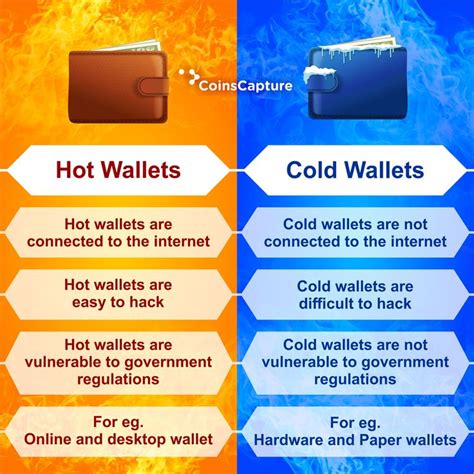Cold wallet vs. hot wallet: security aspects in cryptocurrencies
The world of cryptocurrencies has exploded in recent years, adding new coins and chips on the market every day. While this increase has opened new opportunities for investment and trade, this will increase the risk of loss due to security violations or hacking attacks. Two key elements of any cryptocurrency portfolio are wallets and cold storage methods. In this article, we are immersed in the differences between the cold wallet and the hot wallet, discuss their security considerations and give tips to ensure cryptocurrencies.
What is your wallet?
The wallet is a software that allows users to store, send and receive cryptocurrencies. Basically, a digital container where you keep private keys, titles and other sensitive information about your wealth. There are two main types of wallets: online wallets and offline (or cold) wallets.
Online wallets
Online wallets such as Metamask or Coinbase, connect to your computer or mobile device via the Internet. They offer a convenient method for storing and managing cryptocurrencies on various devices. However, online wallets have some security concerns:
* Hacking Risks: If an attacker gets access to wallet data or private key, they can steal the coins.
* Data Violation: Online wallets can be sensitive to data violations that can endanger sensitive information.
* Replacement Risk: When using an online wallet, the cryptocurrency exchange is exposed.
Cold wallets
A cold wallet is a safe storage solution that protects private keys and titles from hacking or damage to data. Basically, a digital container that stores cryptocurrencies offline, away from the Internet. Cold wallets can be physical devices (hard drives, USB sticks) or software applications that store devices on a local computer.
Cold wallets offer a number of security benefits:
* Physical security: Private keys and addresses are stored on a secure device or vault, reducing the risk of data violation.
* No Internet connection: Cold wallets do not need an internet connection to operate, eliminating the risk of hacking or data violation.
* Long -term storage: Cold wallets allow cryptocurrencies to store for longer periods, giving peace of mind.
hot wallets
Hot Wallet is a software application that allows users to access cryptocurrencies on your computer. Hot wallets are connected to an internet connection and can be vulnerable to hacking risks:
* Data Violation: If an attacker gets access to the online interface or data storage, they can steal the coins.
* Replacement Risk: When using a hot wallet, is the risk of cryptocurrency exchange.
Safety aspects

To protect cryptocurrencies and minimize security risks, follow these proven exercises to each wallet:
Cold wallets:
- Choose a reputable service provider: Select a cold wallet from a reliable company that is prioritized with user safety.
- Keep your private keys safely: Store private keys in a safe place or use hardware safety tokens (HSTS) to add an extra layer of protection.
- Backup regularly: Create regular backups to ensure that you can regain your devices if necessary.
- Use antivirus software: Protect the cold wallet and operating system from malicious programs.
Hot wallets:
- Allow the two factors authentication (2FA): Add an extra level of security by a second check, such as biometric authentication or SMS codes.
- Use a reputable internet connection:
Make sure the online interface is encrypted and uses HTTPS to protect your data.
3.
Leave a Reply